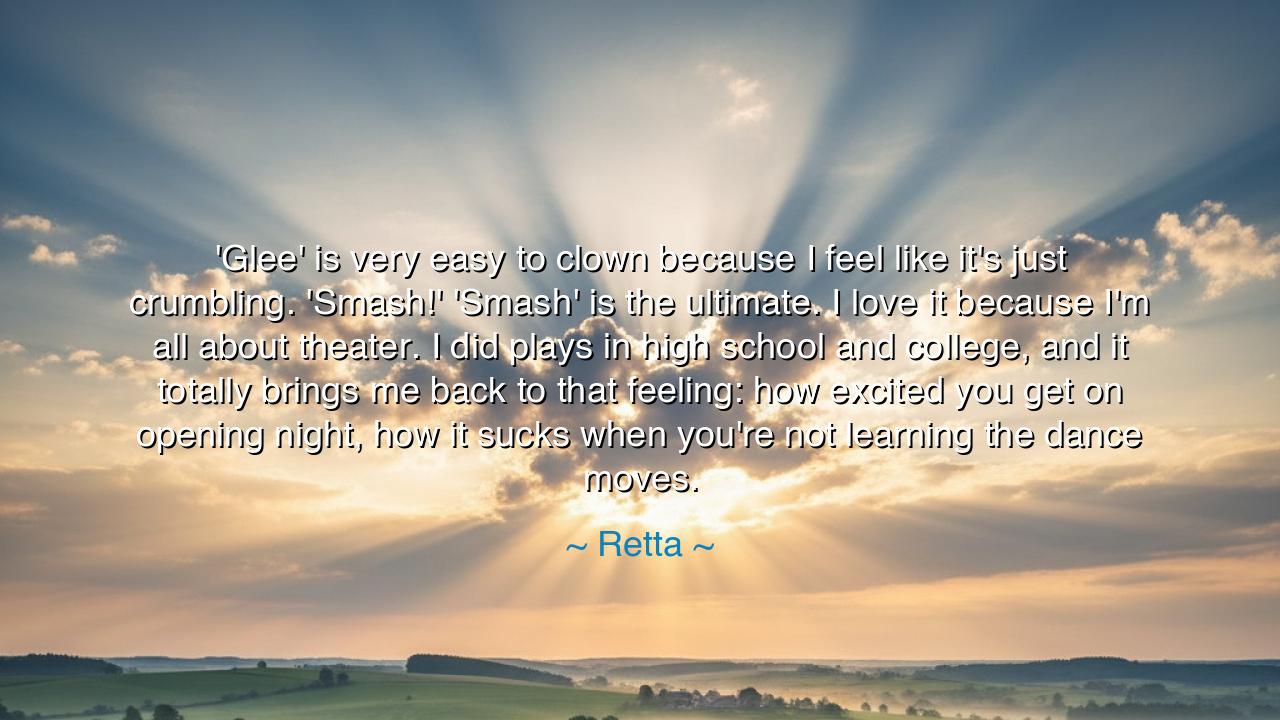
'Glee' is very easy to clown because I feel like it's just
'Glee' is very easy to clown because I feel like it's just crumbling. 'Smash!' 'Smash' is the ultimate. I love it because I'm all about theater. I did plays in high school and college, and it totally brings me back to that feeling: how excited you get on opening night, how it sucks when you're not learning the dance moves.






When Retta spoke of her love for “Smash” and her playful critique of “Glee,” she was not simply commenting on television. Beneath her humor lies a tender truth about art, memory, and the passion of performance. Her words — "'Glee' is very easy to clown because I feel like it's just crumbling. 'Smash!' 'Smash' is the ultimate. I love it because I'm all about theater. I did plays in high school and college, and it totally brings me back to that feeling: how excited you get on opening night, how it sucks when you're not learning the dance moves." — reveal the eternal longing for creation, for the stage, for that sacred blend of fear and joy that comes when the curtain rises. In her voice, one hears both the laughter of the present and the echo of youth, when dreams burned bright under the soft glow of stage lights.
To understand her meaning, one must look beyond the comparison of shows and glimpse the heart of the performer. For Retta, “Smash” was not merely entertainment — it was a mirror to her own journey, a remembrance of the trembling heartbeat that every artist knows before stepping into the light. The stage, whether of theater or life, is a temple where one learns courage. The actor waits in the dark, unsure if the lines will come, if the body will move as trained, if the audience will believe. Yet in that fear there is a divine thrill, a taste of the immortal. It is that feeling of opening night, as she says, that binds all artists together across centuries — the tension between fragility and glory.
In the ancient world, the Greeks built their amphitheaters not merely for amusement, but as altars of truth. Actors wore masks not to hide, but to reveal what words alone could not. When Sophocles’ Antigone first echoed through the stone of the Athenian hills, the audience did not just see a play; they saw their own hearts laid bare — their defiance, their duty, their sorrow. Retta’s words are an echo of that same fire. The modern performer and the ancient tragedian share one sacred purpose: to make humanity feel alive again. Even when “Glee crumbles,” as she jokes, its remnants still shimmer with the dust of that eternal pursuit — to move, to sing, to be felt.
Her reflection on not learning the dance moves speaks to another universal truth — the ache of imperfection. Every artist, every dreamer, has known the shame of stumbling when the world demands grace. Yet Retta reminds us that such moments, though painful, are also holy lessons in humility. The theater teaches the soul that perfection is not the goal — connection is. Just as a dancer finds rhythm through failure, so too must we find harmony in our missteps. For it is only by falling that one learns the true joy of rising again.
Let us remember also the story of Sarah Bernhardt, the great actress of the 19th century, who performed through illness, pain, and even after losing a leg. She could have surrendered to despair, yet she returned to the stage, declaring, “The theater is my life.” She understood what Retta feels — that the stage is not simply a place of applause, but of resurrection. The actor’s courage is the courage of every soul that dares to live passionately despite imperfection.
Retta’s humor conceals wisdom: she laughs at the “crumbling” of one show but praises another for its vitality, its truthfulness to the art of theater. This is a gentle reminder to us all — that authenticity breathes longer than spectacle. What fades is not always failure; it is merely transformation. The spirit of creation passes from one form to another, from “Glee” to “Smash,” from youth to memory, from stage to soul.
Therefore, the lesson of her words is this: honor the passion that once made your heart race. Whether your stage was a theater, a classroom, or a quiet dream long left behind, return to it in spirit. Remember the trembling joy of your own opening night — the first time you dared to create, to sing, to love, to risk being seen. That energy, that pure excitement, is the divine pulse of life itself.
So let the wisdom of Retta’s reflection guide you: find your stage again, wherever it may be. Embrace your imperfections as part of the dance. Laugh at what crumbles, celebrate what inspires, and above all, keep performing with heart. For in the theater of existence, every day is an opening night, and every soul is both audience and actor in the great play of being alive.






AAdministratorAdministrator
Welcome, honored guests. Please leave a comment, we will respond soon